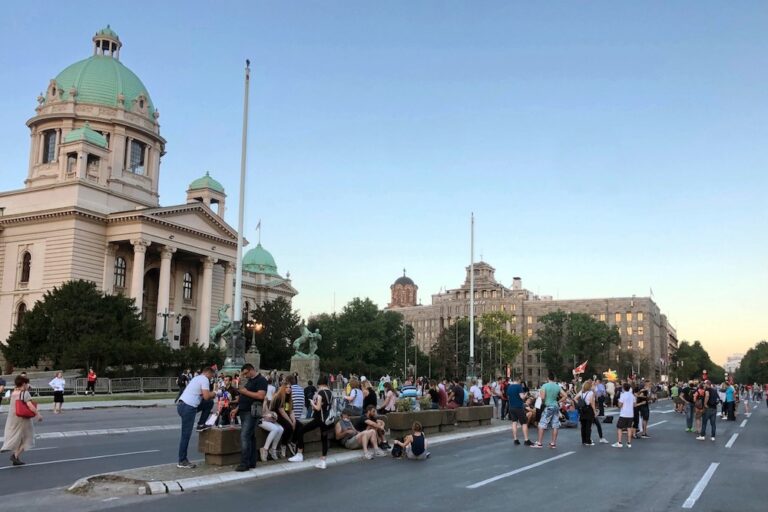(AMARC/IFEX) – The following is a 9 December 1998 press release by the Association of Independent Electronic Media (ANEM) distributed in its entirety by AMARC: ANEM press release Yugoslav Secretary of Information Accuses Radio B92 and ANEM of Being Run by the British Embassy in Belgrade Belgrade–December 9, 1998 In a show on the state-run […]
(AMARC/IFEX) – The following is a 9 December 1998 press release by the
Association of Independent Electronic Media (ANEM) distributed in its
entirety by AMARC:
ANEM press release
Yugoslav Secretary of Information Accuses Radio B92 and ANEM of Being Run by
the British Embassy in Belgrade
Belgrade–December 9, 1998
In a show on the state-run Radio Belgrade on Tuesday, Yugoslav Secretary of
Information Goran Matic claimed that “activities of Radio B92 and ANEM, are,
in fact, the activities of the British Embassy in Belgrade.” As grounds for
this claim, he cited a fax “we have received… from our source at the
British Embassy… in which the British Embassy ‘urges ANEM to send the
project proposal for the training of six journalists from Kosovo, five
ethnic Albanians and a Serb’…”
Mr. Matic interpreted this as meaning that “the British Embassy has engaged
in activities far beyond those listed in the job description of a diplomatic
mission and service, with the attempt to deeply interfere in internal
political relations of the FRY,” and went on to say that “such behaviour is
unacceptable and would have to be labelled improper as soon as possible.”
Radio B92 and ANEM take this as another attempt by the government to
discredit them and an introduction into a harsher and comprehensive attack
on them, that will ensue after the bans of Radio Index, TV Pirot, City Radio
in Nis, Radio Kontakt in Pristina and Radio Senta.
“Regime obviously minds any form of professionalisation, because what the
government representatives want is an ideologised journalism that would play
the role of an extended hand of the authoritarian government,” said Veran
Matic, ANEM Chairman.
The ANEM chairman pointed to the fact that for a year now, the Yugoslav
Secretary of Information had thwarted the establishment of an outlet of the
BBC-run European School of Journalism, by refusing to issue his approval on
the BBC’s repeated demands. ANEM has implemented a number of journalistic
and technical courses, but due to the unstable political situation in
Kosovo, decided that the first joint course for the Kosovo journalists, both
Albanian and Serb, be held in London. The journalists come from stations in
Kosovo (Radio Koha, Radio 21 and Radio Kontakt) that have applied with
complete documentation in the frequency allocation tender by the Yugoslav
Telecommunications Ministry but have had no response regarding their
applications. Furthermore, Radio Kontakt was banned in June, only two days
after it started rebroadcasting news programs by Radio B92.
“Apart from banning stations, the regime obviously wants to ban education —
not only that for journalists, but also broader education, which becomes
clear if we look at the results of the enforcement of the Law on
Universities,” Matic said.


